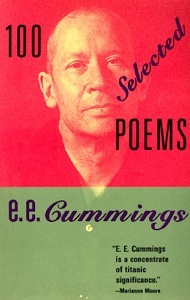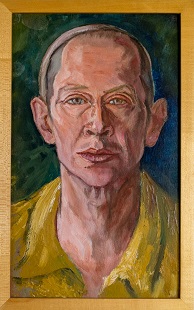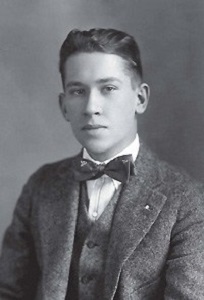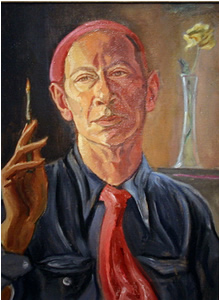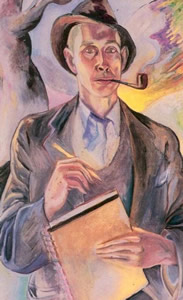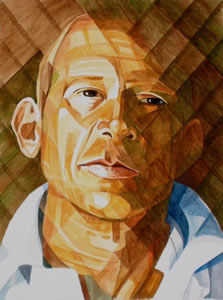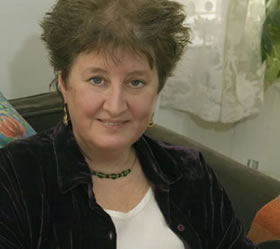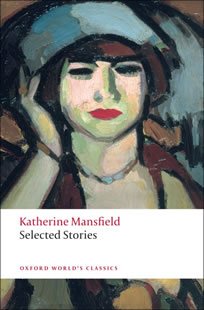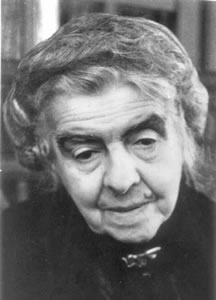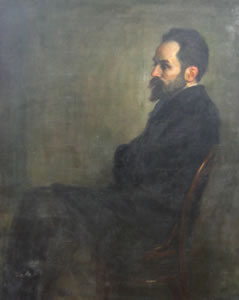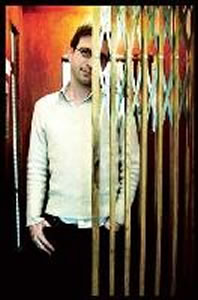Dolce far niente
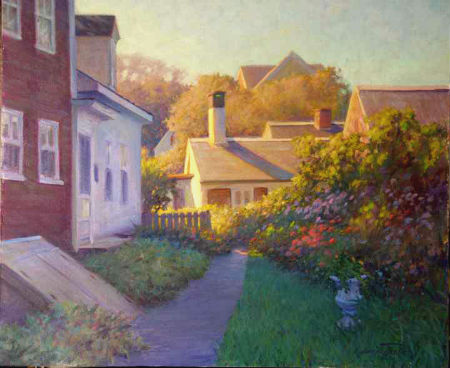
October Light door Ernest Principato, z.j.
Oktober
Oktober kommt mit blauem Rauch
der Wind will Äpfel pflücken
und gelbe Birnen gibt es auch
und süßes reift im Brommbeerstrauch
du brauchst dich nur zu bücken
So rot und gold wie Feuerschein
steht nun der Wald am Hügel.
Das Eichhorn sammelt Nüsse ein,
der Falter sitzt am warmen Stein
und breitet weit die Flügel.
ein Spinnwebfaden fließt im Wald
es rascheld auf den Wegen
der Häher schreit die Nacht wird kalt
und auf die Wiesen wird sich bald
der erste Raureif legen.

Ursula Wölfel (16 september 1922 – 23 juli 2014)
Het raadhuis in Duisburg-Hamborn, de geboorteplaats van Ursula Wölfel
De Nederlandse schrijver Daniël Rovers werd geboren in Zelhem op 14 oktober 1975. Zie ook alle tags voot Daniël Rovers op dit blog.
Uit: De waren
“In een donkerblauwe tent op een camping in het door elzenhagen omzoomde zuidoosten van Engeland, liggend in een slaapzak met een vanillevlagele voering op een oprolbaar eiermatras, had ik ooit een droom die me altijd is bijgebleven.
Was het wel een droom? Op het moment dat ik mijn ogen opende en naar het wit van de binnentent keek, kon ik niet eens met zekerheid zeggen of ik het me die nacht allemaal alleen maar had verbeeld. Ik lag op mijn rug, richtte mijn ogen op de tentstok en hoorde mijn broer zo zwaar ademen dat het leek alsof hij één grote luchtpijp geworden was. Ik was tien jaar oud. Aan de andere kant van het doek floot een vogel onvermoeibaar steeds opnieuw dezelfde wijs.
Wat ik had meegemaakt was zo overweldigend echt dat ik ervan overtuigd was dat het waar moest zijn of in ieder geval binnen niet al te lange tijd waar zou worden. Iets of iemand had een gat in mijn bestaan geslagen en door de opening kreeg ik toegang tot een ruimte waarvan ik het bestaan niet eens had vermoed, een wereld die altijd al verborgen had gelegen onder de huid die de mijne werd genoemd. Opeens was alles anders geworden, ikzelf het meest.
Niet dat er, zoals dat in de boeken heet, in mijn slaap aan een verkeerd gelegen been een vrouw of een man was ontstaan, ik had een ander, minder tastbaar soort volwassenheid ervaren. Ik had geen avonturen beleefd of horrorscenario’s doorstaan, was niet van grote hoogte naar beneden geduwd en had me niet uit alle macht wakker hoeven te denken voordat ik te pletter stortte op de grond, wat me in nachtmerries nooit op tijd lukte, zodat ik altijd weer stierf en daarna kon vaststellen dat ik het had overleefd, eerder bedroefd vanwege het eenzame einde dan gelukkig met de onverwacht goede afloop.
Middagen en avonden lang had ik met een jongen en een meisje gesproken die ik daarvoor nooit had gezien. We luisterden naar elkaars verhalen, lachten om de grappen, voerden ernstige gesprekken – en juist dat was het vreemde eraan. Een dag eerder had ik niet geweten hoe je dat zou moeten doen, een gesprek voeren, ik moet het in één nacht tijd hebben geleerd.
We kwamen bij elkaar in een grote, diepe achtertuin met aan de uiterste rand, daar waar het bos begon, een rij hoge dennenbomen. We zaten rond een vuurtje van gesprokkelde takken en keken naar de vlammen en het smeulende hout. Ouders, broers en zussen – ze kwamen niet kijken, ze lieten ons met rust.
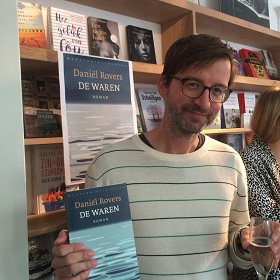
Daniël Rovers (Zelhem, 14 oktober 1975)
De Nederlandse dichter en schrijver Maarten van der Graaff werd geboren op 14 oktober 1987 in Dirksland. Zie ook alle tags voor Maarten van der Graaff op dit blog.
Hypochonder aan de slag
In de hemel stonden
de doden als plechtige dundrukken kakel-
wit te zijn met elkaar.
Dat was een kinderziekte.
Nu weet ik: het is alles ongeremde
uiteenval. Een opluchting, zeker,
toch mag ik gerust
tot de kortademigen worden gerekend.
Achter al het gezwoeg klinkt
de zoemende almacht van de
versnipperaar.
Niets mooier dan dat, begrijp me goed.
Niets vind ik lekkerder dan de orde
van een lukrake
verse ontbinding.
Voor de verachters van de binnenkamer
Waarom ga ik nog altijd naar buiten,
ik weet wat daar is.
De langgerekte fluittoon de aangrenzende
resten, de drooggekookte klaarheid der dingen:
precieze verhoudingen.
En daar heb ik dus een schijthekel aan
(een regenbui balsemt milddadig)
dat alles is zoals het is
waarom ga ik nog wandelen, om een esdoorn in zijn esdoorn-zijn
te sterken? (hierachter sterven er geruisloos)
de esdoorn moet zijn eigen rottige zelf maar toeknikken
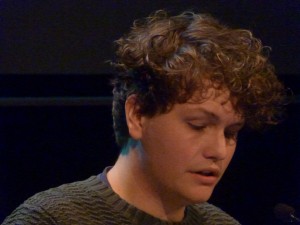
Maarten van der Graaff (Dirksland, 14 oktober 1987)
De Amerikaanse dichter en schrijver Edward Estlin Cummings werd geboren in Cambridge, Massachusetts op 14 oktober 1894. Zie ook alle tags voor E. E. Cummings op dit blog.
Summer Silence
Eruptive lightnings flutter to and fro
Above the heights of immemorial hills;
Thirst-stricken air, dumb-throated, in its woe
Limply down-sagging, its limp body spills
Upon the earth. A panting silence fills
The empty vault of Night with shimmering bars
Of sullen silver, where the lake distils
Its misered bounty.—Hark! No whisper mars
The utter silence of the untranslated stars.
as freedom is a breakfastfood
as freedom is a breakfastfood
or truth can live with right and wrong
or molehills are from mountains made
—long enough and just so long
will being pay the rent of seem
and genius please the talentgang
and water most encourage flame
as hatracks into peachtrees grow
or hopes dance best on bald men’s hair
and every finger is a toe
and any courage is a fear
—long enough and just so long
will the impure think all things pure
and hornets wail by children stung
or as the seeing are the blind
and robins never welcome spring
nor flatfolk prove their world is round
nor dingsters die at break of dong
and common’s rare and millstones float
—long enough and just so long
tomorrow will not be too late
worms are the words but joy’s the voice
down shall go which and up come who
breasts will be breasts thighs will be thighs
deeds cannot dream what dreams can do
—time is a tree(this life one leaf)
but love is the sky and i am for you
just so long and long enough
the Cambridge ladies who live in furnished souls
the Cambridge ladies who live in furnished souls
are unbeautiful and have comfortable minds
(also, with the church’s protestant blessings
daughters, unscented shapeless spirited)
they believe in Christ and Longfellow,both dead,
are invariably interested in so many things-
at the present writing one still finds
delighted fingers knitting for the is it Poles?
perhaps. While permanent faces coyly bandy
scandal of Mrs. N and Professor D
….the Cambridge ladies do not care,above
Cambridge if sometimes in its box of
sky lavender and cornerless, the
moon rattles like a fragment of angry candy

E. E. Cummings (14 oktober 1894 – 3 september 1962)
Cover
De Hongaarse schrijver Péter Nádas werd geboren op 14 oktober 1942 in Boedapest. Zie ook alle tags voor Péter Nádas op dit blog.
Uit: Parallel Stories (Vertaald door Imre Goldstein)
“He was not cold, yet his whole body was shivering. The plainclothes officer offered him a blanket, go on, wrap it around yourself, but he rejected it with an irritated gesture, as if the condition of his body, an impending cold or the awk-ward and embarrassing shivering, did not interest him in the least. He probably had some kind of nervous fever, a phenomenon not unfamiliar to law-enforcement people. Neither could he be certain of the impression he was making. He felt he was not making a good one, which in turn compelled him to present every-thing in ever greater detail. This last policeman, however, regarded him with delight, with an enthusiasm bordering on love, as he observed the agitation in the young man’s facial features, body, and individual limbs, and his ceaseless gesticulation, wondering whether to think of him as choleric or ascetic, as someone with above-average intelligence and sensitivity or simply as a city idiot interested only in himself. As a person so starved for speech that he could not stop before tomorrow. As one to whom nothing ever happened but who now was becoming tangled in a suddenly arrived great adventure; as one entrusted with nothing less than the secrets of thc universe. He elicited pity and some worry. In the end he could talk only to this one police officer, but he completely enthralled him with his feverish words, his ve-hement but disciplined and therefore fractured gestures, and his mental makeup that defied classification. After methodically scanning the various surfaces and points of the young man’s body and attire, and because the observed exterior seemed so average that even its social situation would prove hard to determine, this detective asked the young man which university he was attending and what he was studying, slyly adding that he asked not officially but only as a private person. Theoreti-cally he had no right to pose such a question, but he knew from experience that sometimes a few innocent words will stanch sickly and senseless gushing. The death of strangers can cause real hysteria even in the most endomorphic persons. At the same time he did not mean the question to be a formal one; he was interested to see how the young man might be steered by such an in-nocent query, how far he might be led from his self-admiration, or perhaps how he could be trapped; how tractable he was. Although he was one of those well-trained detectives who usually avoided being misled by an unex-pectedly deep impression or a labyrinthine imagination, the plainclothesman could not resist the experiment, at least to the extent of asking, the provocative question.”
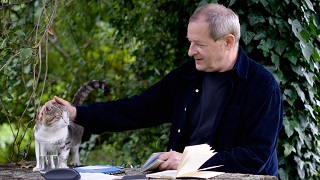
Péter Nádas (Boedapest,14 oktober 1942)
Zie voor nog meer schrijvers van de 14e oktober ook mijn vorige blog van vandaag.

